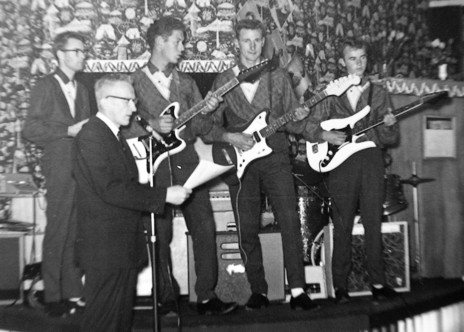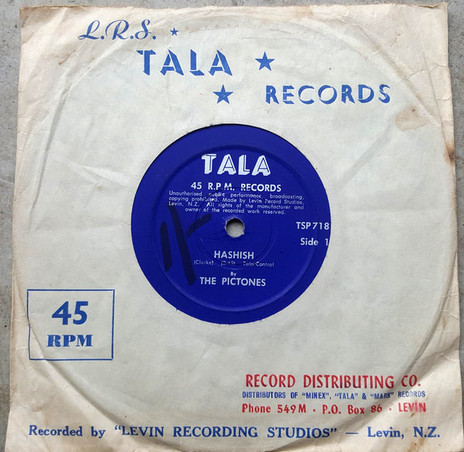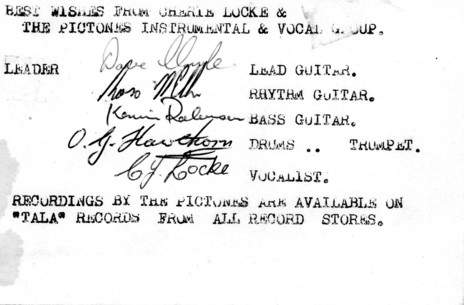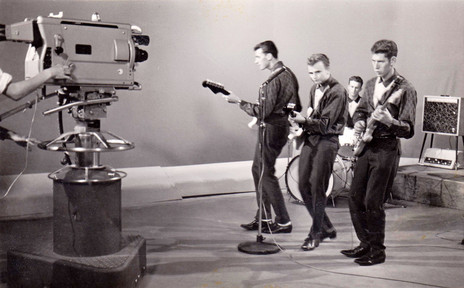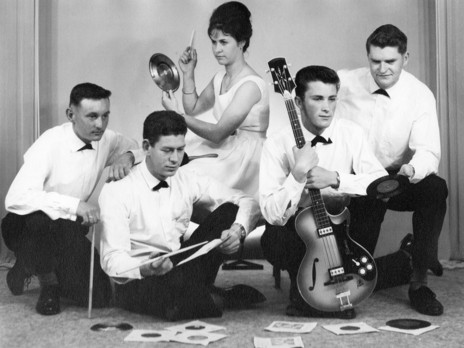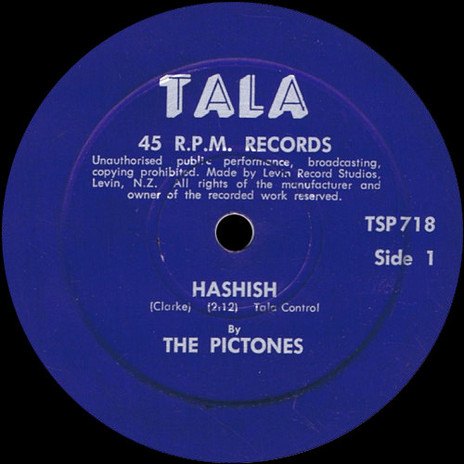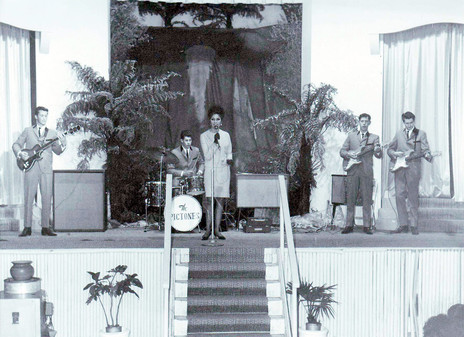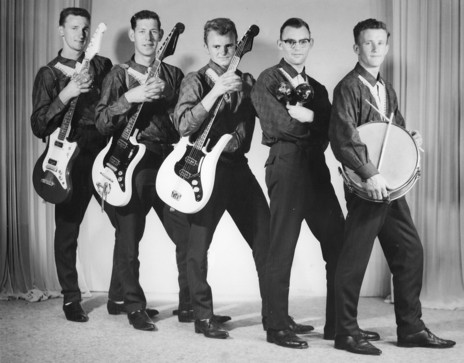These cuts perhaps aren’t seminal New Zealand recordings but the hard-working Pictones became more than a footnote in our music culture, especially when they recorded another instrumental the following year.
It is the title which grabs our attention today and raises questions. The Pictones’ second single was called … ‘Hashish’.
The title of the Pictones’ single ‘Hashish’ grabs our attention today and raises questions.
In 2011 when I posted a recording of ‘Hashish’ on my Elsewhere website I idly speculated on how little hashish there must have been around 50 years earlier. None was a decent guess, certainly in Levin. That was confirmed by a phone call from the band’s guitarist Dave Clarke, then aged 70, who wrote the tune.
He had googled the band name and my piece came up, was flattered that his band had been remembered and so gave me a call. He was funny and chatty. Sadly he would pass away five years later.
No, he said, of course the band had no idea what the title meant: “We were so naive. We toured with a female vocalist and if anyone suggested anything inappropriate they would have been dead meat. We were just kids.”
Clarke’s recollection was that Wally Clark – the owner of the Levin Recording Studios, the local record store in Levin and founder of the TALA label – gave the piece its title. Wally Clark produced the recording and, Dave recalls him saying, “‘Hey, that sounds like a drunk person wandering around or a person on drugs’. That’s where the name came from. He named it.”
The Pictones’ story however goes broader than a single with a title that was unusual for its time. When I published a subsequent article about them, including Clarke’s recollections, a number of people got in touch to say how well they remembered the band, Clarke’s playing (“I went see Dave play whenever I could ... he had a distinctive sound”) and how influential they were.
Dave Hurley of The Breakaways recalled The Pictones on Facebook as “the first electric band I saw … they played our school [in the] very early 60s. They had homemade Fender gats but Trevor [Harrison] had his cow-horn bass”.
The band played frequently for almost a decade until they broke up in 1967. An online photo of the band playing an electricity exhibition claims the year is 1972, but their appearance – especially their collarless Beatles suits – would suggest the event was much later.
In fact, online at the Rotorua Museum website there are a number of wonderful images taken in mid-1964 showing the Pictones enjoying a North Island tour. There are colour photos of them playing at Rotorua’s Chevron Restaurant, wearing smart suits, and Morrie Holmes at his monogrammed drum kit. They back a variety of female singers dressed in patterned frocks; one photo shows the band beside their early 50s Vauxhall Velox car, which is daubed with the names of places on their March-April 1964 tour: Hamilton, Taihape, Rotorua, Auckland, Wanganui, Stratford, Wellington.
The Pictones modified their image; they even wore Beatle wigs made of real hair.
And by this time they – as had so many groups at the time – had modified their image. The hair was longer, the suits sharper. The band that had once coincidentally recorded the same song as the Beatles now looked like them. Clarke laughed when he recalled how, when the tide started to turn, they even wore Beatle wigs made of real hair. The Rotorua photos offer evidence.
According to Clarke, The Pictones’ story began in the late 1950s (“about 1958, maybe 57”) and they got their name when they played the Rainbow Room in Palmerston North. “They had to call us something when they advertised us. [The proprietor] said, ‘You’ve got picks, so we’ll call you The Pictones.”
Clarke recalled how shows were back then, when he was about 17. The Pictones were initially “supper extras,” which meant when the main band went off for supper The Pictones would take to the stage. At that point in the evening the audience would be chatting, so their role was to provide the instrumental background.
That explains their early recordings, but they also prided themselves on their musical breadth: rock’n’roll to light instrumentals and bossa nova. Indeed they were perhaps the first local band to record in that Latin-American style.
Clarke said he didn’t have any of their four singles – his kids would take them to parties “and guess what?” – and was especially disappointed not to have a copy of ‘Zambesi Bossa Nova’ b/w ‘Anna Bossa Nova’ from 1962. Those discs got them gigs where they introduced the bossa style of music and dance to audiences, and took them to Wellington for a television appearance.
The Pictones’ early line-up was Clarke on lead guitar, Colin Severts on rhythm guitar, pianist Bruce O’Connor, drummer Brian Dredge and bassist Trevor Harrison. And they worked with women singers, notably Donna Reid, Sally Sadler and Cherie Locke.
They were in considerable demand around the lower part of the North Island, “playing a minimum of three nights a week”.
Wally Clark of TALA was very supportive and over the years there were a few line-up changes, bassist Harrison leaving for the very popular Flares Show Band which had Maurice Greer on drums. Harrison and Greer then forming the Big Three with guitarist Peter Knowles, and Greer would go on to be a member of The Four Fours and The Human Instinct.
The Pictones played on but, as with so many musicians of that period, they were caught in the changing tides of musical taste. For guitarist Clarke – whose influences were Italian ballads, country-jazz, the Shadows, the Ventures, Peter Posa, Chet Atkins, Les Paul, Gray Bartlett and so on – the new age of the guitar hero as epitomised by Eric Clapton and Jimi Hendrix was just too far out.
Dave Clarke didn’t stop when the band did however. He carried on making music with his wife Rhondda, a singer, and he just loved it. And as with so many from that decade who got in for the thrill and the sheer pleasure of making music, he told me he “never made a cent” out of music.
But the Pictones were the springboard for Harrison, influenced younger players, and provided pleasure for hundreds at dances and restaurants.They also had a piece of music in 1962 called ‘Hashish’. Not many bands could claim that back then, or even now.
